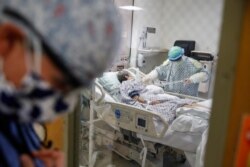This March, as the COVID-19 pandemic caught fire in the United States, cardiologist Santiago Garcia started preparing for a massive influx of patients with heart attacks.
Viral outbreaks often raise the rate of heart attacks, Garcia said, and he and the Minneapolis Heart Institute where he practices expected a surge from the growing pandemic.
"That never happened," Garcia said in an interview.
Meanwhile, stroke doctors also were getting ready for a wave that never materialized.
"Everyone was saying, 'I'm seeing less strokes, and I'm also seeing people come in later'" after stroke onset, neurosurgeon Clemens Schirmer at Geisinger Health System in Pennsylvania said in an interview.
It wasn't clear if what Schirmer and Garcia were seeing at their hospitals were isolated cases or something bigger. So they started checking with others across the country.
Avoiding hospitals
They were not alone.
In a study Garcia co-authored, nine high-volume hospitals on the East Coast, West Coast and Midwest saw a 40% drop in heart attack patients from February to March this year.
Schirmer saw a similar pattern with strokes. Patients at 12 stroke centers nationwide arrived nearly three hours later on average compared with last year, according to a study he co-authored.
The Centers for Disease Control and Prevention reports that emergency department visits overall fell 42% in April nationwide.
It's unlikely that fewer people are having heart attacks and strokes. They seem to be staying away because they're afraid of catching COVID-19 at the hospital.
Coronavirus outbreaks have overwhelmed health systems from Wuhan, China, to northern Italy to New York City. But these studies found that patients were avoiding hospitals whether or not they were in COVID-19 hot zones.
"There clearly seems to be this sentiment that engaging with the health care system right now is a bad idea," Schirmer said.
Nearly a third of respondents in a recent American College of Emergency Physicians poll said that they had avoided or put off medical care out of fear of infection.
'Time is brain'
Delaying treatment can have serious consequences.
For stroke patients, "time is brain," Schirmer said. Patients lose an estimated 1.9 million brain cells for each minute a stroke goes untreated.
"If you don't get this taken care of right away, then your chances of recovery are severely diminished," he said.
The same goes for heart attacks. Chances of survival decline as time goes by. Plus, even if the patient survives, damage to the heart muscle greatly raises the risk of heart failure later in life, Garcia said.
At the beginning of the U.S. outbreak, hospitals seemed dangerous, he noted.
"If you watched TV in March and you see these hospitals in New York overflowing with patients, that's not a place where you want to go," Garcia said.
Plus, nationwide, testing for the virus was wholly inadequate. Personal protective equipment (PPE) for health care workers was in short supply. Hospitals canceled elective surgeries. And officials urged people to stay home.
"Patients got the message, and they stopped coming" to hospitals, he said.
In the months since, testing and PPE supplies have improved. Medical groups are working to get the word out that patients with serious conditions are better off going to the hospital than putting off treatment.
"We need to nudge this somewhat tilted perception of what the risks and benefits are back to what it should be," Schirmer said.










